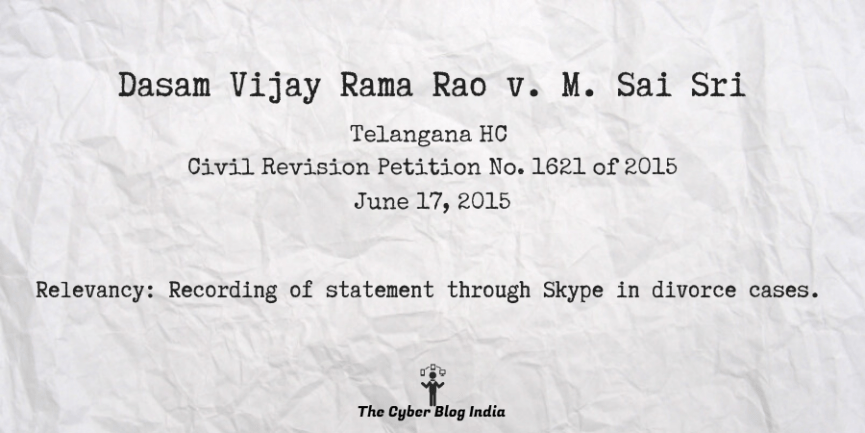Dasam Vijay Rama Rao v. M. Sai Sri

Dasam Vijay Rama Rao v. M. Sai Sri
AIR 2015 Hyd 191
In the High Court of Telangana
Civil Revision Petition No. 1621 of 2015
Before Justice Nooty Ramamohana Rao
Decided on June 17, 2015
Relevancy of the case: Recording of statement through Skype in divorce cases.
Statutes & Provisions Involved
- The Information Technology Act, 2000 (Section 4)
- The Hindu Marriage Act, 1955 (Section 13B)
- The Family Courts Act, 1984 (Section 14, 15, 16)
- The Indian Evidence Act, 1872 (Section 65A, 65B)
- The Powers of Attorney Act, 1882 (Section 2)
Relevant Facts of the Case
- The petitioner, in this case, is the husband and the respondent is his wife. They are both Hindus by religion and faith and married as per Hindu rites and customs.
- Certain irreconcilable differences arose between the couple in spite of the best efforts made by them, their friends, well-wishers and elders of the families of both. They could not retrieve their broken marriage and hence, both of them have mutually agreed to dissolve their marriage.
- The wife regularly attended the proceedings in person. However, the husband was unable to do so since the husband is stationed outside India.
- He, however, constituted his father as an attorney to pursue proceedings in India. Family Court rejected it as not maintainable.
- Therefore, the husband filed an interlocutory application for participating in court proceedings through his father. The Court must thus, decide whether to record the husband’s statement through Skype.
Opinion of the Bench
- The bench observed that Courts in India are also making efforts to put to use the technologies available. Skype is one such facility which is easily available.
- Therefore, the bench opined that family courts are justified in seeking the assistance of any practising lawyer to provide the necessary Skype facility in any particular case. Subsequently, the parties can be represented by a legal practitioner, who can bring a mobile device.
- By using Skype technology, parties staying abroad can not only be identified by the family court but also enquired about the free will and consent of such parties.
- The bench opined that this would significantly reduce litigation costs and would also save the Court’s precious time. Furthermore, the other party available in the court can also help the court in not only identifying the other party but would be able to ascertain the required information.
Final Decision
- The bench directed the Family Court to direct the petitioner’s chosen legal practitioner to make available the Skype facility for the Court to interact with the petitioner who is staying in Melbourne, Australia
- Furthermore, the video must record the consent and proceed with the matter thereafter as expeditiously as possible.
